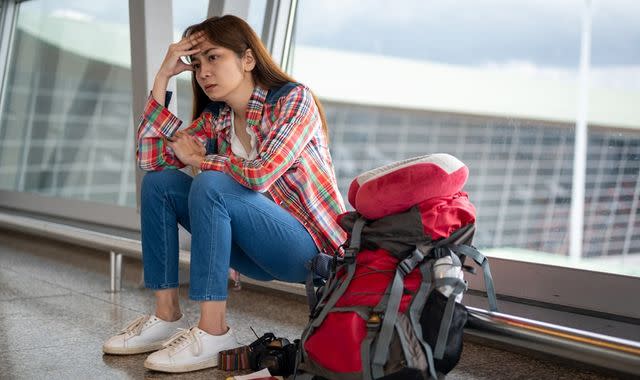Holiday booking scams and the red flags to avoid

You've been looking forward to your trip for months, but as you're waiting at the airport you discover - to much frustration - that your flight has been cancelled.
Damn! Better go on to social media to tweet the company - you're hoping it might get their attention quicker than waiting on hold for an agent or in a long queue at the airport with hundreds of other passengers.
Within a short while, you have a reply - finally some good news!
The airline asks you to DM them, and after some back and forth they're willing to book you on to another flight. They'll need your payment details again, though.
Little did you realise, this was a tricky-to-spot scam. In your weariness you hadn't realised you were talking to a fake social media profile posing as your chosen airline.
This is one common holiday booking scam that has been tricking people out of their cash online.
In a report this year, Lloyds revealed holiday purchase scams have risen by 7% over the past year, with nearly half starting on Facebook.
The scams to watch out for
Clone websites - these can appear for airlines, holidays, villas and more. Although you may think you're on a legitimate site, you may not have spotted the URL has been changed. You may even get fake confirmation emails or booking references.
Social media promotions - similar to the clone websites, these can often impersonate airlines or hotels, or they may advertise accommodation that doesn't exist.
Fake activities - when travellers end up paying for activities from fraudulent operators and the tour or activity does not exist.
Phishing emails - these can appear to come from a legitimate provider and will often ask travellers to confirm their personal and payment details.
Fake social media messages (as we mentioned above) - after passengers reach out for help on social media, scammers might reply posing as the airline or tour operator.
Service fees for documents - a long-running scam sees copycat websites pop up where a fee is charged to process or renew a document or health insurance card.
Airport parking - some scammers will claim to have a "safe place" for your car but that might not be the case, with some drivers returning to find their cars filthy, damaged or with added mileage.
Counterfeit Atol numbers - while the Atol sign should mean your holiday is protected, scammers can use counterfeit numbers on fake web pages.
How can you avoid getting scammed?
Consumer champion Jane Hawkes, also known as Lady Janey, says it's important to do your research in the first place.
If the website claims to be part of any official travel body, check this for yourself.
For example, you can check if a company is truly Atol protected here.
Read reviews for the company too - although be aware that some may have fake reviews (these aren't easy to spot, but you should check for things like whether lots of reviews were posted at the same time, if lots of the reviews go over-the-top, and if many use the same phrasing).
You can also do a Google Maps search for the property being advertised.
Check contact details are readily available on websites and that there is a telephone number.
"Many scam sites purposely don't have one," Jane explains.
"If you can't get hold of a company for general enquiries, it'll be a whole lot more difficult if something goes wrong."
Jane also says you should check for red flags such as poor spelling and grammar in adverts, limited-time offers, and the pressure to make decisions on the spot.
She recommends keeping all communication on the official platform, for example, when booking through Airbnb.
"Scammers will try to lure you away in order to gain your personal and banking details. Steer away from any personal correspondence via email, WhatsApp or text," she says.
Read more
Think twice before buying holiday clothes from Zara
World's best restaurant named - how much does it cost?
How Germany is ramping up security for 'high-risk' England game
When it comes to booking, Jane says to never action a bank transfer or provide your bank details in response to an advert.
She suggests using a credit card if the offer is legitimate - this means you'll benefit from extra cover if anything goes wrong.
Don't agree to PayPal transfers, especially if the transfer is made as "PayPal Friends and Family" as this reduces the protection PayPal can offer.
For the highest level of consumer protection, Jane recommends booking a package holiday with a trusted travel agent.
If you have been the victim of a scam then you should report it to the Financial Conduct Authority, Trading Standards, Police Action Fraud or Citizens Advice Scam Action as appropriate.


